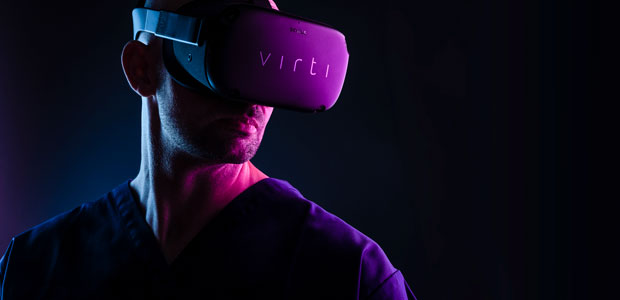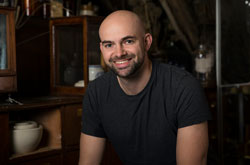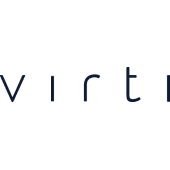
Virti: Improving human performance in the workforce
If you’ve read any of my previous articles for Startups Magazine, you may have noticed that anything related to healthcare excites me beyond belief. Fun fact about me: I used to have a massive fear of doctors but I’ve since turned that into an unhealthy obsession with the healthcare sector and I’m now known as the ‘Queen of all things Medical’ by my colleagues. So of course, when I discovered digital training startup, Virti who are focusing initially on healthcare, my blood pressure shot up with excitement and you’ll see why as you read on.

Former NHS surgeon (trauma and orthopaedic surgeon if you want to get technical), turned tech startup founder, Alex Young, grew up knowing he wanted to be a doctor. But he also had quite an entrepreneurial side. You don’t have to be as obsessed with Grey’s Anatomy or ER as I am to know that medical students’ time is precious. However, Young built and sold his first company whilst still at medical school! If that doesn’t give you an inspiration boost, then I don’t know what will.
Once he graduated medical school and became a doctor, the entrepreneurial spirit didn’t stop there. Young, like most doctors, began to encounter a problem with his day to day job and this sparked an idea.
The problem
For healthcare professionals, knowing how to perform under pressure can quite literally be a matter of life and death. The first time Young’s skills were truly tested under pressure was the first time he encountered an acutely unwell patient. This is a massive patient safety concern and according to Young, one of the biggest unmet challenges of our time.
He explained: “According to a study published in the BMJ, a weekly peer-reviewed medical journal, medical error is the third leading cause of death in the US, and costs health providers upwards of $20bn in pay-outs. To mitigate against this, providers end up spending even more money on mandatory in-house skills training. For sectors outside of healthcare traditional training is delivered via textbooks, videos, and expensive face-to-face training sessions.
“These experiences lack the emotion and stress of the real-world, leaving employees under-prepared with no objective way to know if they will perform when it matters. So, seeing and experiencing this first-hand, that there was no cost-effective way to scale in-person coaching to improve human performance, lead me to the idea of my next business venture, Virti.”
The solution
Virti is a digital training platform that uses virtual and augmented reality and AI to transport users into realistic environments. It also uses computer vision to assess how users respond to stress to reduce anxiety and improve performance. Virti is starting with the healthcare industry and has plans to move on to other industries in the future. Young’s mission is to make experimental training affordable and accessible for everybody and to improve human performance in the workforce.
Virti is a cloud-based platform that can be accessed by employees on mobile or desktop, as well as a virtual and augmented reality headset. Virti is focused on data science analysis and how training can be uniquely captured from those mediums. Young explained: “For example, using our system, you could be immersed into an operation. Our data can then track things like how quick your eyes are moving, and how quickly you react to clinical decisions that are being posed to you in the virtual environment.”
“We tend to focus on infrequent high-risk clinical events, as well as soft skills training for health professionals, at any stage. We're very problem focused around what we do, rather than being fixed on a type of medical specialty or any other technology - we’re focusing on how we capture unique data insights on how people train or perform.”
One of the unique things about Virti’s platform is how broad the content is, covering everything from mental health training to surgical procedures. The training simulations that Virti provide allow healthcare professionals to make mistakes and learn from them in a safe environment. Young explained: “One of the biggest issues that we see with traditional healthcare training, or any type of training in fact, is how to recreate the stress and emotion of real clinical practice without actually being there and without having a real patient. And then equally, how are you able to collect data on how people perform under pressure in those environments at scale?”
On the tech side of things, Virti collects data around communication, teamwork, skills, and decision making, which are all things that are traditionally assessed by an individual giving their opinion on how somebody is communicating. Young explained how this isn’t always the best way to do things as people can sometimes be unconsciously biased. The way Virti combats this is by using computer vision, with AI technology, as well as natural language processing, which is then able to analyse how people are interacting in virtual environments.
Natural language processing allows Virti to analyse communication skills. For example, there could be a team leader that’s being a little too aggressive with their team members. The Virti system will then feedback this data, and it also has the ability to collect, store and analyse the training video that’s captured so that Virti can reduce the variability in the way that people are trained and improve patient safety.
“We’re really driving this in the medical sector to start with because it’s hugely expensive, both in terms of pay-outs to patients, but also in doctor or staff burnout. Poor communication is already attributed to about 70% of medical complaints, so that’s a huge amount of stress on doctors and nurses, in an already very stressful environment.”
The C-word
Coronavirus. A word that has become a part of our daily vocabulary. Yes, I know we are all sick of talking about it now, but I couldn’t not bring it up… especially as it’s shone a spotlight on everything Virti has been doing already.
Of course, the coronavirus has affected every single industry, in more ways than one, and it’s been an extremely stressful time for all businesses, no matter how big or small. But looking on the bright side, it has been incredible to see the adoption of new technologies in the healthcare system over the past few months.
Young explained that the company has seen a lot of interest from both existing customers and new around how Virti can help quickly upscale the workforce. Specifically, one of the things the company did was provide COVID-19 training. This involved simple things such as how to wash your hands, to how to put on and take off your Personal Protective Equipment (PPE) without leaving yourself open to the risk of infection. As well as communication skills and how to perform CPR when you’re wearing face masks and PAPR headgear (which is the PPE that looks like an astronaut suit) which can be extremely difficult for the patient as the doctor/nurse is completely covered up and as such typical bedside manner is lost.
“One of the things that our system can do, which is relatively unique, is that we can put the learner, so a doctor or a nurse in this case, into the perspective of a patient in a room, so you can effectively see what it's like to be a patient with a doctor or a nurse coming in suited up in PPE. The aim is to help the learner develop more empathy, such that when they put on that PPE, they are aware that even though they are doing their normal day to day job, the patient might be scared and feeling a lot more isolated, so it’s important for the doctor or nurse to take that into account.” explained Young.
At the beginning of the pandemic, Virti also released a range of free tools across the UK and US which were designed to show people the correct way to wash your hands (which people often get wrong, believe it or not). The company was also selected as one of the winners of the NHS’s TechForce 19 challenge, which helped to combat COVID-19.
Teamwork makes the dream work
Virti has got a team of 15 employees, most of them game developers, coders, data scientists, based in Bristol. Young said that Bristol is a great place to start up a tech company because it's a big tech hub outside of London and has some fantastic creative spaces and employees all over the city.
The company also has offices in Houston, Texas, which is the main US team base, with a smaller office in Los Angeles, California. And just before COVID hit, Virti was just about to open a small office in New York but unfortunately have delayed that until things open back up.
Young also shared his excitement that Virti is the only trading educational company to be a part of the NHS National Innovation Accelerator programme, as well as the Texas Medical Centre’s Innovation space.
Artificial Intelligence
How important would you say AI is in the current tech landscape?
“AI has been similar to AR/VR, in the sense that there’s a huge amount of buzz and interest around it initially and then things seem to have died down. But actually, we’re seeing more and more systems integrating AI into everything they’re doing. For me, AI is a natural progression of how we’re analysing and how we’re handling Big Data. I think that the applications of AI and even what AI stands for and does, is a little bit like our product, it requires quite a lot of education for organisations. So when we talk about AI, people don’t often realise that there's a whole breadth of underlying technologies involved.”
How crucial do you think AI will be in a post-COVID world?
“I believe it’s going to be absolutely essential. Whether that may be analysing how quickly the disease is spreading or using AI to predict the future spread of the disease. We are having to change our work life habits for the foreseeable future, if not forever, and we can’t do face-to-face training at the moment. AI is providing a way that employees can get elements of face-to-face training using things like virtual humans, or analysing behaviours in a remote environment, which would have never been done traditionally.”
What are the biggest tech trends you’ve seen over the past 12 months?
“I think it would definitely have to be computer vision. I’ve noticed that some of the larger organisations are starting to use computer vision, particularly augmented reality, where you can identify objects in the real world, and map surfaces in the retail sector.”


